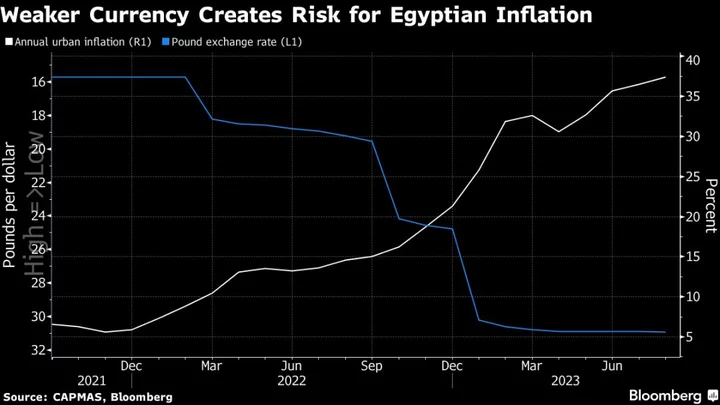Egypt looks poised to hold interest rates again Thursday as the latest Middle Eastern conflict on its borders gives the economically troubled country a further reason to tread carefully.
The North African nation was already expected to save its next bout of monetary tightening until it enacts another much-anticipated currency devaluation — a step that’s unlikely to happen before December’s presidential elections. The unpredictable consequences of the Israel-Hamas war may also favor a rate pause, even with annual inflation running at a record 38%.
Nine of 13 economists in a Bloomberg survey expect the central bank’s Monetary Policy Committee to leave the benchmark deposit rate at 19.25%, already its highest level in data that stretches back to 2006. The rest predict hikes of between 75 and 100 basis points.
Egypt’s economy may get a “deflationary shock” should its income from tourism and energy flows decline due to the war, though it’s too early to judge the extent with certainty, according to Jean-Michel Saliba, Middle East and North Africa economist at Bank of America Corp.
“Increasing rates is unlikely to have much impact on inflation while it could add to domestic sovereign-financing borrowing costs,” he said.
The impact of a prolonged conflict on Egypt’s economy isn’t clear. Fighting has already cut off the country’s gas imports from Israel and stoked speculation over the future of Egypt’s shipments of liquefied natural gas to Europe.
At the same time, the West’s recognition of Egypt’s pivotal regional role may bring new aid and investment pledges as Cairo tries to overcome its worst economic plight and foreign-currency shortage in decades.
Read More: Egypt Seeks to Boost IMF Loan Over $5 Billion Amid Currency Woes
Egypt has devalued its pound three times since early 2022 in a bid to tackle the crisis, with inflation soaring and the currency losing almost half its value. The International Monetary Fund, which agreed on a $3 billion rescue deal with Egypt last year, wants to see further exchange-rate flexibility before it signs off on a crucial program review.
The pound has been trading at Egyptian banks at 30.9 to the dollar for months, far below the rate of 46 at which it changed hands in recent days on the local black market.
With authorities unlikely to force another price shock on Egyptians before the Dec. 10-12 election, most economists expect more progress on the IMF program won’t come until the first quarter of next year.
Read More: Egypt Clears One Hurdle for IMF Review, Faces Other on Currency
That doesn’t completely rule out a rate increase on Thursday.
While the bulk of monetary tightening would come around the completion of the IMF reviews, a hike is needed now to “pre-emptively address mounting pressures on the pound,” said Samira Kalla, economist for the Middle East and North Africa at Deutsche Bank AG.
Those might “further emanate from the ongoing regional conflict, including through lower tourism inflows,” she said.
--With assistance from Harumi Ichikura.

